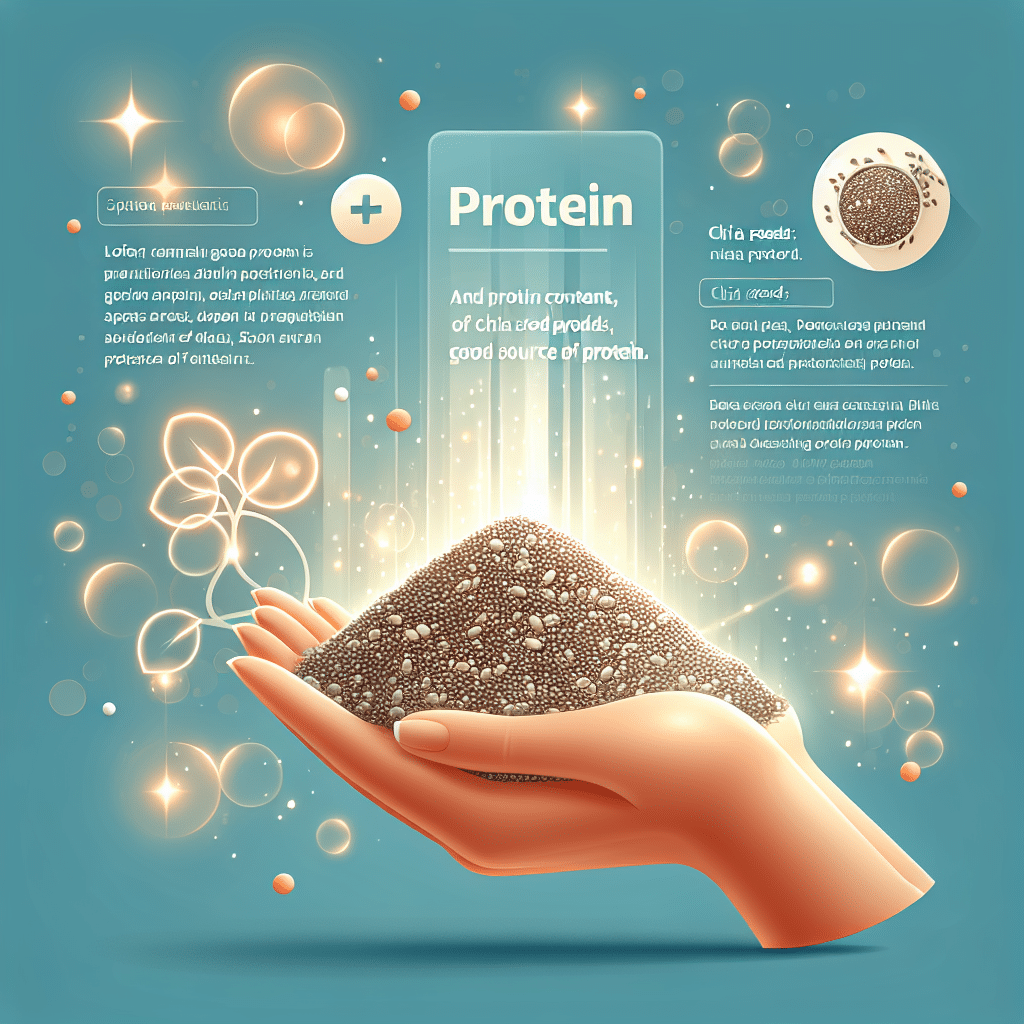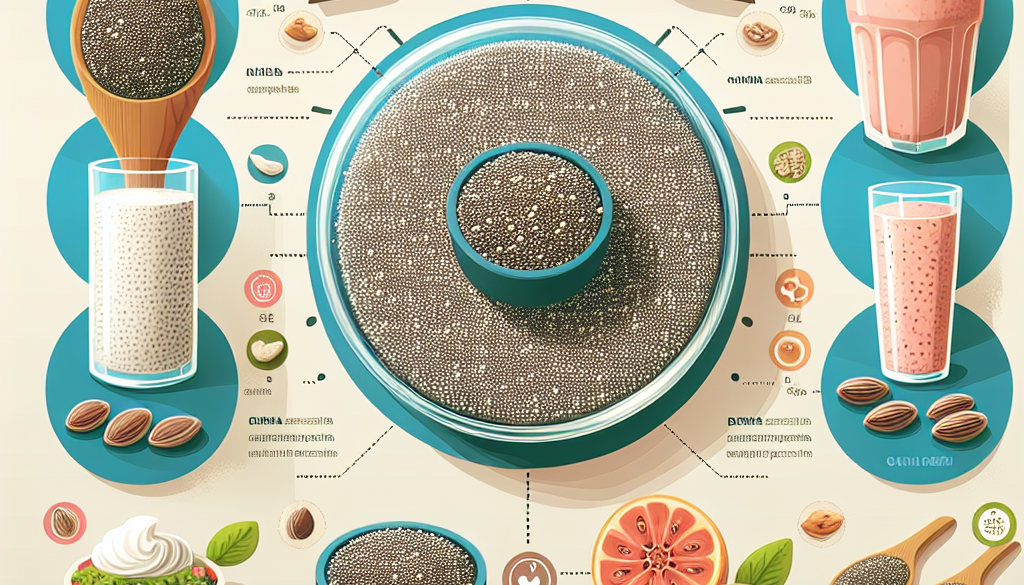Are Chia Seeds Good Source Of Protein?
-
Table of Contents
- Chia Seeds: A Robust Source of Protein for Your Diet
- Understanding the Protein Content in Chia Seeds
- Comparing Chia Seeds to Other Protein Sources
- Health Benefits of Chia Seeds
- Incorporating Chia Seeds into Your Diet
- Considerations and Potential Drawbacks
- Conclusion: The Protein Power of Chia Seeds
- Discover ETprotein’s Premium Protein Products
Chia Seeds: A Robust Source of Protein for Your Diet

Chia seeds have gained immense popularity in the health food scene over the past few years. These tiny seeds are known for their impressive nutritional profile, which includes omega-3 fatty acids, fiber, and antioxidants. However, one question that often arises is whether chia seeds are a good source of protein. In this article, we will delve into the protein content of chia seeds, compare it with other protein sources, and explore the benefits and considerations of including chia seeds in your diet.
Understanding the Protein Content in Chia Seeds
Protein is a crucial macronutrient necessary for building and repairing tissues, making enzymes and hormones, and supporting overall health. Chia seeds are often touted as a high-protein food, but how do they really stack up?
- Protein Quantity: Chia seeds contain approximately 4 grams of protein per tablespoon (15 grams), which translates to about 14 grams of protein per 100 grams.
- Amino Acid Profile: They are a complete protein source, meaning they contain all nine essential amino acids that the body cannot synthesize on its own.
- Protein Quality: The quality of protein in chia seeds is comparable to other plant-based proteins, making them a valuable addition to vegetarian and vegan diets.
Comparing Chia Seeds to Other Protein Sources
When evaluating chia seeds as a protein source, it’s important to compare them to other common protein-rich foods.
- Animal Proteins: Foods like chicken, beef, and eggs typically offer more protein per serving than chia seeds. However, chia seeds are a plant-based option that also provides fiber and healthy fats.
- Other Plant Proteins: Legumes, nuts, and other seeds may offer more protein per serving, but chia seeds have the advantage of being a complete protein with a strong nutrient profile.
- Protein Supplements: While protein powders can deliver a concentrated dose of protein, chia seeds offer additional nutritional benefits such as antioxidants and minerals.
Health Benefits of Chia Seeds
Chia seeds are not only a good source of protein but also offer a range of health benefits.
- Weight Management: The fiber in chia seeds can help you feel full longer, potentially aiding in weight management.
- Heart Health: The omega-3 fatty acids in chia seeds are beneficial for heart health, helping to reduce cholesterol levels and inflammation.
- Bone Health: Chia seeds are rich in calcium, phosphorus, and magnesium, all of which are essential for bone health.
- Regulating Blood Sugar: The combination of fiber and protein can help stabilize blood sugar levels, making chia seeds a good choice for people with diabetes.
Incorporating Chia Seeds into Your Diet
Chia seeds are incredibly versatile and can be easily incorporated into your daily diet.
- Add to Smoothies: Blend chia seeds into smoothies for a protein and nutrient boost.
- Yogurt and Oatmeal: Sprinkle chia seeds over yogurt or oatmeal for added texture and nutrition.
- Baking: Use chia seeds in baking as a nutrient-dense ingredient in bread, muffins, and pancakes.
- Chia Pudding: Combine chia seeds with milk or a dairy-free alternative and let them sit overnight to create a pudding-like consistency.
Considerations and Potential Drawbacks
While chia seeds are a healthy addition to most diets, there are a few considerations to keep in mind.
- Allergies: Some people may be allergic to chia seeds, so it’s important to introduce them slowly into your diet.
- Caloric Density: Chia seeds are calorie-dense, so portion control is key, especially if you’re watching your calorie intake.
- Interactions: Due to their high fiber content, chia seeds can interact with certain medications. Consult with a healthcare provider if you have concerns.
Conclusion: The Protein Power of Chia Seeds
In conclusion, chia seeds are indeed a good source of protein, especially for those following a plant-based diet. They provide a complete amino acid profile, along with a host of other nutritional benefits. While they may not be the highest in protein content compared to some other foods, their overall nutrient density makes them a valuable addition to a balanced diet. When consumed in moderation and as part of a varied diet, chia seeds can contribute significantly to your daily protein intake and overall health.
Discover ETprotein’s Premium Protein Products
If you’re looking to enhance your protein intake further, consider exploring ETprotein’s range of high-quality protein products. ETprotein specializes in organic bulk vegan proteins that cater to various dietary needs and preferences. Their offerings include organic rice protein, pea protein, and a variety of seed-based proteins, all characterized by a neutral taste and non-GMO, allergen-free attributes.
For those interested in the unique benefits of L-(+)-Ergothioneine (EGT), ETprotein also provides this compound in various grades suitable for the nutraceutical, pharmaceutical, and cosmeceutical industries. With a commitment to quality and customer satisfaction, ETprotein is a trusted supplier for leading global brands and companies.
To learn more about ETprotein’s products and how they can support your health and wellness goals, contact them at sales(at)ETprotein.com today.
About ETprotein:
ETprotein, a reputable protein and L-(+)-Ergothioneine (EGT) Chinese factory manufacturer and supplier, is renowned for producing, stocking, exporting, and delivering the highest quality organic bulk vegan proteins and L-(+)-Ergothioneine. They include Organic rice protein, clear rice protein, pea protein, clear pea protein, watermelon seed protein, pumpkin seed protein, sunflower seed protein, mung bean protein, peanut protein, and L-(+)-Ergothioneine EGT Pharmaceutical grade, L-(+)-Ergothioneine EGT food grade, L-(+)-Ergothioneine EGT cosmetic grade, L-(+)-Ergothioneine EGT reference grade and L-(+)-Ergothioneine EGT standard. Their offerings, characterized by a neutral taste, non-GMO, allergen-free attributes, with L-(+)-Ergothioneine purity over 98%, 99%, cater to a diverse range of industries. They serve nutraceutical, pharmaceutical, cosmeceutical, veterinary, as well as food and beverage finished product distributors, traders, and manufacturers across Europe, USA, Canada, Australia, Thailand, Japan, Korea, Brazil, and Chile, among others.
ETprotein specialization includes exporting and delivering tailor-made protein powder and finished nutritional supplements. Their extensive product range covers sectors like Food and Beverage, Sports Nutrition, Weight Management, Dietary Supplements, Health and Wellness Products, and Infant Formula, ensuring comprehensive solutions to meet all your protein needs.
As a trusted company by leading global food and beverage brands and Fortune 500 companies, ETprotein reinforces China’s reputation in the global arena. For more information or to sample their products, please contact them and email sales(at)ETprotein.com today.












